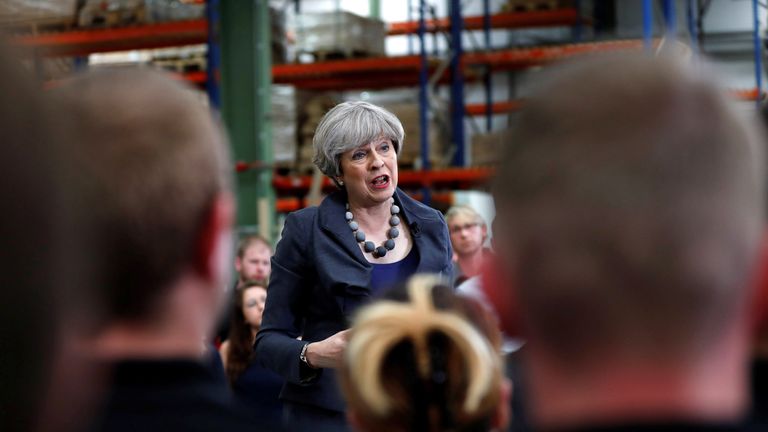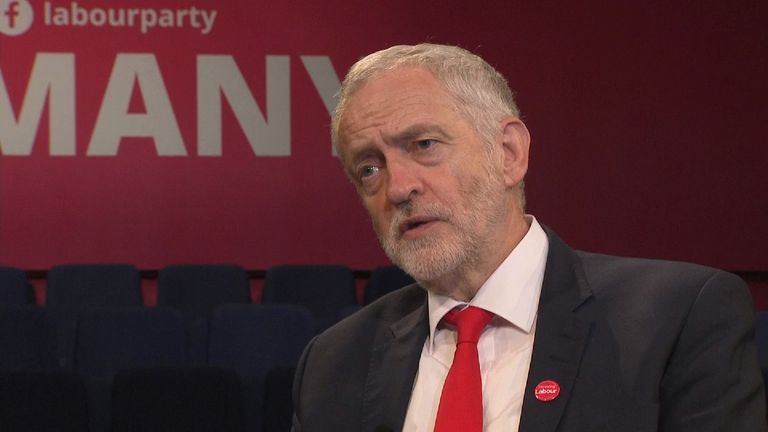PM stands firm behind 'ten of thousands' migration pledge
Despite warnings it could hurt the economy, Mrs May says she is sticking to her aim of dramatically reducing immigration levels.
Friday 2 June 2017 11:37, UK
Theresa May is working towards hitting her manifesto target of reducing net migration to the tens of thousands by the end of the next Parliament.
On the campaign trail across target seats in the North East, West Yorkshire and Derbyshire, the Prime Minister insisted it was right to "work for those sustainable levels", despite repeatedly missing the target as home secretary.
Brandon Lewis, the police minister, said on Thursday that the Conservatives wanted to see migration levels come down to the tens of thousands over the next Parliament.
And the Prime Minister rode in behind her minister, confirming: "That's what we're working for."
Addressing workers at a furniture factory in Pontefract, the Prime Minister told Sky News that she was determined to tackle immigration levels, despite warnings from think tanks on the economic fallout of cutting migration to the UK.
"The reason why we want to bring net migration down to sustainable levels of the tens of thousands is because of the impact that immigration has when it's too fast and too high and uncontrolled on people - and it does have an impact on people particularly on the lower end of the income scale," she said.
"We believe it is right to work for those sustainable levels, but what I've always said, and what I've made clear in the manifesto, is you need to work consistently on this.
"There's no single thing you can do that suddenly creates that particular set of numbers, you're constantly having to work at it to look at all parts of it."
Reducing UK immigration to the levels promised by Mrs May will damage the economy, according to a report released last week.
The Centre of Economics and Business Research concluded that a rapid reduction in net migration to below 100,000 a year could reduce the potential size of the economy by between 1.5 and 3% by 2025.
The Office of Budget Responsibility last year estimated that a 80,000 drop in annual net migration would increase net borrowing by £6bn a year.
This is because migrants tend to be working and contribute more to the British coffers than they take out in benefits and public spending.
But Conservatives believe that Mrs May's tough talk on immigration will play well in working class areas that voted to leave the EU in last year's referendum.
In the final week of campaigning, the Prime Minister made three pit stops across the North East to the East Midlands as she sought to reboot her faltering election campaign by getting back to Brexit basics in Labour's Vote Leave heartlands.
The Prime Minister pledged to embrace the "promise of Brexit" as she insisted she could make a success of leaving the EU and build a "brighter future" for Britain in a tour of traditional Labour seats that voted to leave the EU.
Mrs May is hoping that her Brexit message will encourage UKIP and Labour supporters to switch sides, with the Tories targeting seats where attracting support from former Ukippers could tip them over the winning line.
One example from her tour was Middlesbrough and East Cleveland, where the Tories are chasing a Labour majority of 2,268 and the UKIP vote stood at 6,935 in 2015.
The singular focus back on Brexit comes after a difficult couple of weeks for the Prime Minister, with Jeremy Corbyn gaining ground on her.
She called the snap election to "strengthen her hand" in the Brexit negotiations by increasing her Commons majority of 17.
But her misstep over a plan to make middle England pay more for their social care - a pledge she was forced to u-turn on just days later - has left her on the back foot.





